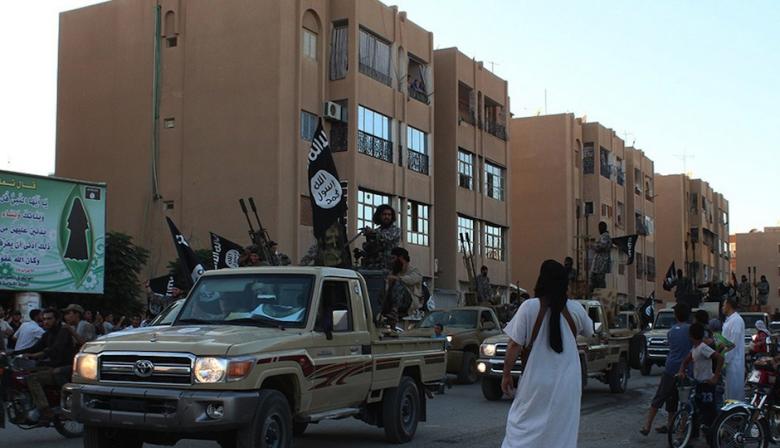SIS (Islamic State in Iraq and Syria) increased its grip on “Wilayat al-Raqqa”, the capital of the Islamic State. It is setting the foundation of its rule through courts, resolving disputes between civilians, and social committees serving the “Muslims” inside the borders of the province. This is in addition to using an iron fist policy against anyone daring to “destabilize the security of the Islamic State.”
The bus trip from Beirut to the city al-Raqqa is around 12 hours. Three years ago, it barely took half the time. Young Syrian workers are looking forward to seeing their families.
Mohammed Abdullah, who has a degree in economics, works as an accountant in one of Beirut’s suburbs. This is his first visit in two years. He knew about the situation in the area from communicating with family and friends, as well as from the social media.
Mohammed described his trip to his hometown to Al-Akhbar, after being absent for two years: “ISIS elements welcomed us at the first checkpoint. The Saudi dialect was strongly present. They made sure there were no soldiers among the travelers and that women wore the niqab.”
Only a short distance separates the Syrian army and National Defense Forces checkpoint, on one hand, and the former al-Nusra Front position, currently occupied by ISIS. However, all communication is cut off as soon as a person crosses into the governorate’s administrative borders.
“Inside the city, the signs of destruction are obvious on some government buildings and homes,” Mohammed added.
“Revolutionary streets”
Cars in the district run on manually refined crude oil derivatives. Nobody remembers the last time regular fuel arrived from the port at Tartous.
Mohammed said he was worried about telling the taxi driver his home address. “Shall I say, take me to Martyr Bassel al-Assad highway? And if I said take me to Colonel Hussein Harmoush Street, renamed by the Free Syrian Army, would he know it?
The taxi driver noticed the young man’s confusion and asked several questions about Mohammed’s route. “What’s wrong? You could have said you wanted to go to Bassel street. No worries. Get in. I will take you there,” the driver replied.
FSA brigades and civil society activists tried to change street names in Raqqa. Tal Abyad Street, the city’s most popular, was renamed after martyr Ali al-Babinsi. However, people keep using the old name. In any case, very few people know its official name in city records, which is al-Qunaytirah Road.
Martyr Basel al-Assad Street was turned into Colonel Hussein Harmoush Street and al-Jalaa or “Clock” Roundabout became Freedom Square. “Mr. President Square” is now Martyrs’ Square, but people on both sides call it after the nearby fire station.
Civil society activists had also painted some of the city’s statues with the colors of the “revolutionary flag.” However, ISIS removed the “flag of infidels” and raised its banners everywhere.
“Islamic services”
At night, Raqqa’s residents like to walk around the quiet streets or sit at cafes. There is no armed presence or news about thefts or violations. Cigarettes and alcohol are smuggled into the city and sold at double their price.
Alaa Jubran, a resident of Raqqa who was there on a recent visit, told Al-Akhbar, “Street vendors do not occupy the city’s sidewalks anymore. ISIS established a popular market in the city center. It was equipped to include the vendors and traveling salesmen, banning them from using the streets.”
ISIS transferred the busy Friday market next to Raqqa’s old wall, a historical site, and moved moved market day to Thursday so it would not distract people from attending Friday prayers in the mosque.
It also created a consumer protection office and imposed monthly payments on commercial establishments, in return for sanitation, electricity, water, and phone services. At a later stage, this will be extended to civilians to ensure the continuity of services.
Two signs in particular are hanging in shop windows. “Sisters, please do not remove the niqab inside the shop,” said one. The other announced that “work stops 10 minutes before prayers.” Prayer rooms were established in public venues and streets become almost empty before prayer times, save for ISIS’ patrols.
However, Mohammed could not hide his admiration of ISIS’ policies inside the province, although they have been keeping his brother in custody for months. He praised its gunmen, “who returned what they could of items stolen from public buildings by FSA fighters.”
The Islamist Traffic Police is on every street and market, wearing the same uniform, conducting traffic, and issuing tickets. Inside official buildings and facilities, the staff is committed to serving the citizens. Emergency vehicles of the water and electricity departments are rushing to fix problems all the time.
On the other hand, the recently created Islamic Services Authority supervises state institutions. The Accounts Bureau monitors the markets, sales operations, applying sharia, and holding violators accountable.
Civilian dreams
The official weekend is now on Thursday and Friday. Residents of Raqqa are trying to cope with the new realities. “They became weary of the state of instability they passed through in the preceding nine months. They were always afraid of sudden clashes between the brigades. But now there is only one ruler,” Mohammed explained.
“The situation in Raqqa is not perfect, but it is much better today,” Alaa added. “People lost hope in the FSA, whose fighters fled after stealing city property and seizing archaeological artifacts, bank holdings, and cotton and wheat crops.”
“Civilians only want to live in peace, regardless of the ruler, ISIS, the Syrian regime, or al-Nusra Front. People demand to be allowed to return to the quiet life they had in their city,” he concluded.
This article is an edited translation from the Arabic Edition.

